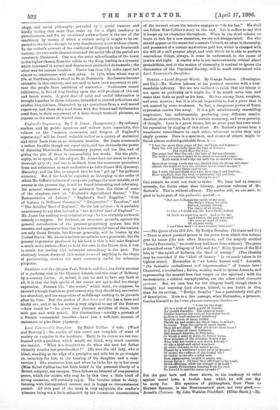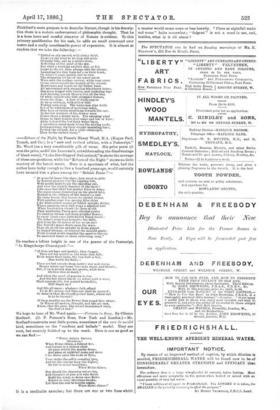POZTEY. —Loved Beyond Words. By George Barlow. (Remington and Co.)—Mr.
Barlow labours at his poetical vocation with a com- mendable industry. But we are inclined to think that his labour is not spent as profitably as it might be, if he would write less, and make that little as good as his best. He.has strong lines, couplets, and even stanzas; but it is almost impossible to find a piece that is not marred by some weakness. In fact, a dangerous power of fluent expression carries him away. It is a gift mischievously resembling inspiration, but, unfortunately, producing very different results. Another, more serious, fault is a certain monotony, and even poverty, of thought. Love is a great theme, but no great poet has ever made his reputation by singing of this alone. Mr. Barlow's poems bear a wearisome resemblance to each other, whatever merits they may singly possess. Here is a specimen, and scores of others might be found almost undistingaishable from it :- " I love thee more than songs of face and form and feature.— Daily the soft veil shifts npon the face of Nature : The violet flees the rose
The green leaf flees the red ; the love of Nature changes : The wild s. a's restless heart from cloud to sea-bird ranges Each warm wind's lips can melt the mountain's snows.
More than strong words can say, though they be strong and eager (Beside the truth of love the sweetest words sound meagre!) I love thine eyes to see. But I with life and death and pain. firm-lipped and fearless, Have wrestled, that thy soul, so passionate and peerless, Might through eternity belong to me."
One remark we must not omit to make. We have had to censure severely, for faults other than literary, previous volumes of Mr. Barlow's. This is without offence. The author will, we are sure, be glad to have part of his palinodia quoted :—
" Bat now I change the spirit of my song.
The Helper whom we need, Patient, eternal, strong, The slayer of all wrong, Is Christ I doubt not, the Lord Christ indeed.
Of lands we need him most. And as for me, Lord Christ, the man who said ' Wo have no need of thee, Of all men verily
I need thee most I—I most require thine aid I" —The Queen of the Hid Isle. By Evelyn Douglas. (Trfibner and Co.) —There is much poetical power in the poem from which this volume gets its name (the tale after Boccaccio, and the tragedy entitled "Love's Perversity," we could very well have done without). The poem is described as an "Allegory of Life and Art." Elzir, Queen of the Hid Isle, is " the spirit of holiness, the ideal of beauty." (The identity may be conceded if the "ideal of beauty" is rb Raxav taken in its highest sense). Hermadon is "an heroic human soul." Amanda, " the fantastic embodiment and impersonation " of human love Channtval, a troubadour ; &dice, waiting-maid to Queen Amanda, and representing the sensual love that verges on the spiritual ; with the necromancer, a critical metaphysician, are the other chief dramatis personce. Bnt we care less for the allegory itself, though there is thought and meaning (not always, indeed, to our taste) in this, than for its setting. " Evelyn Douglas " has a particularly rich gift of description. Here is a fine passage, when Hermadon, a prisoner, fancies himself to be haus plausor sessorque theatre :- " I can see the stage
All in a glow of light, a gate of heaven, An opened Paradise. The swaying lamps Flicker between the rows of thronging heads.
Sudden in loud orchestral symphony Electric storm of many violins Thrills np, and makes my blood dance in mid-air. It ceases. Then the rattle of many hands.
Then all are silent. What is't draws their test's ?
Is it the woes of sweet Antigone, Self-doomed Alcestis, or Polyxena, Or bleeds a maid at Aube, or, thence borne, Now priestess of the inhuman Taurie time. Flies with her brother and stolen Artemis ?
Or sits a blind and exiled wanderer At white Colons in the sacred grove,
Thence by a whirlwind borne away to heaven ?
Or moans the sufferer of the dismal isle ?
Or rather in the silo, raided bath • Does Agamemnon, caught in purple net, Groan thrice ? Or bear they offerings to his tomb, Drink-offerings, while the avenger is at hand ?
Or speaks Prometheus hanging from his rock
To hornAd Io and the ocean nymphs ?"
But the poet here and there shows, in his tendency to rebel against moral laws, a foolish heat which he will one day be sorry for. His spectres of philosophers, from Plato to Herbert Spencer, in the Necromancers' cave, are very good.— Bramble Cloisters. By John Watkins Pitchford. (Elliot Stook.)—Mr.
Pitchford's main purpose is to describe Nature, though in his descrip- tion there is a certain undercurrent of philosophic thought. That he is a keen lover and careful observer of Nature is evident. To this primary qualification for his task, he adds no small command over metre and a really considerable power of expression. It is almost at random that we take the following :
Eddied or oily smooth with circles faint, Flows on the river to its deep still pools Of dusky blue, and as a mirror clear, Reflecting all the quiet of the sky, But when a hawking swallow dips, or fish Leaps in the air, then plumps into the stream, Launching the tiny foam-bel's on their back, On mimic voyage, quickly lost to view.
The streaming tresses of the water-weeds
Wave with the restless current, while near shore Green crosses crowd the margin of the stream.
Hawthorns and hazels on the hither bank All intertwined with straggling blackberry briers, Dog-roses fanged with thorns, and reddening hips Just forming, loosely thrown o'er all the bine Of white convolvulus with crumpled flowers, Cover the slope. A fleet of ducks appear In nosy colloquy, with yellow bills Fishing neck-deep. The water-hen slips forth Out of its wilderness of quivering sedge, Blue haze of rushes stretching towards the sun.
In the low murmur of the drowsy noon Comes there a deeper hush. The sweeping wind
Drops its light freight, bird songs and low of Line ; Alone is heard the low faint water lapse,
A querulous sound made where the moving reeds, Down-pointing, dip their slender trembling lines, Feeling the current, for a while submerged, Then to the surface rising."
—Echoes of the Night, by Francis Henry Wood, M.A. (Kogan Paul, Trench, and Co.), is a "new and revised edition, with a Postscript." Mr. Wood has a very considerable gift of verse. His prize poem (it won the prize, as did the Laureate's, notwithstanding the disadvantage of blank verse), " Lake-D wellings of Switzerland," is above the average of these compositions, while his " Echoes of the Night " shows no little mastery of the heroic metre. Here is a specimen of what, had the author been lucky enough to live a hundred years ago, would certainly have secured him a place among the "British Poets :"— " At peaceful hours like these, how sweet to glide
In floating, pinnace o'er the rippling tide, With gentle hand to ply the impelling oar, And view the nightly beauties of the shore !
Like some fair child her mother fears to wake, The moon seems slumbering on the placid late,
Rocked in the stillness of her dream.ess rest
By every breeze that heaves its crystal breast. With peerless cups the oponing lilies shine
Like white-robed queens or fabled nymphs divine,
Whose amorous deeds full many a minstrel told When Inspiration struck the lyres of old.
Then wandering Fancy gave celestial power
To tinkling stream and dewy-petalled flower ; In every fount some light-haired Naiad dwells ; 'Tis Echo's voice that animates the dolls, And from the chambers of her oc.an cave The Nereid's music floats upon the wave.
Thus oft of old the nymphs in frolic played • In limpid streams, or coursed the moonlit glade; While jocund mirth impelled the sportive throng To measured dance or sweet enlivening song."
He reaches a loftier height in one of the poems of the Postscript, "In Kingsthorpe Churchyard :"—
" If thou art base and earthly, then despair. Thou art but mortal as the brute that falls. Birds weave their nests, the lion finds a lair, Man builds his halls,—
These are but coverts from earth's war and storm, Homes where our lesser lives take shape and breath ; But, if no heavenly man has grown, what form Clothes thee at death ?
And when thy mead of penalty is o'er,
And fire has burnt the dr. ss, whore gold is none, Shall separate life, bat wasted heretofore, Still linger on P God fills all space ; whatever doth offend From His unboui.ded Presence shall be spurned ; Or deem'st thou He should garner tares, whose end Is to be burned ?
If thou wouldst see the Power that round thee sways,
In Whom all motion, thought, and life are cast, Know, that the pure, who travel heavenward ways, See God at last."
We hope to hear of Mr. Wood again.—Pictures in Song. By Clinton Scollard. (G. P. Putnam's Sons, New York and London.)—Mr. Scoliard constructs neat little poems, sometimes of the vets de soci6fter kind, sometimes on the " rondean and ballade" model. They are neat, but scarcely finished up to the mark. Here is one as good as we can find :—
" WHEN SIRIUS SEINES.
Mondani.) When Shies shines, a fulgent fire, And boasts in a drowsy choir At noon within the maples drone, And pines at nightfall make sad moan I ike waves upon the roam of Tyre, Then strike the softly sounding lyre, And let the soaring song rise higher, Or fall to minor monotone, When Sirius shines.
But should the charming voices lire, And thoughts of past and vain desire Refill the mind, as doves once flown Return to cotes aforetime known, Let then the soul to heaven When Sirius shines."
It is a creditable exercise ; but there are one or two lines which a master would score more or less heavily. "Pines at nightfall make sad moan" halts somewhat ; "fulgent" is not a word in use, and, besides, what is it all about ?



































 Previous page
Previous page